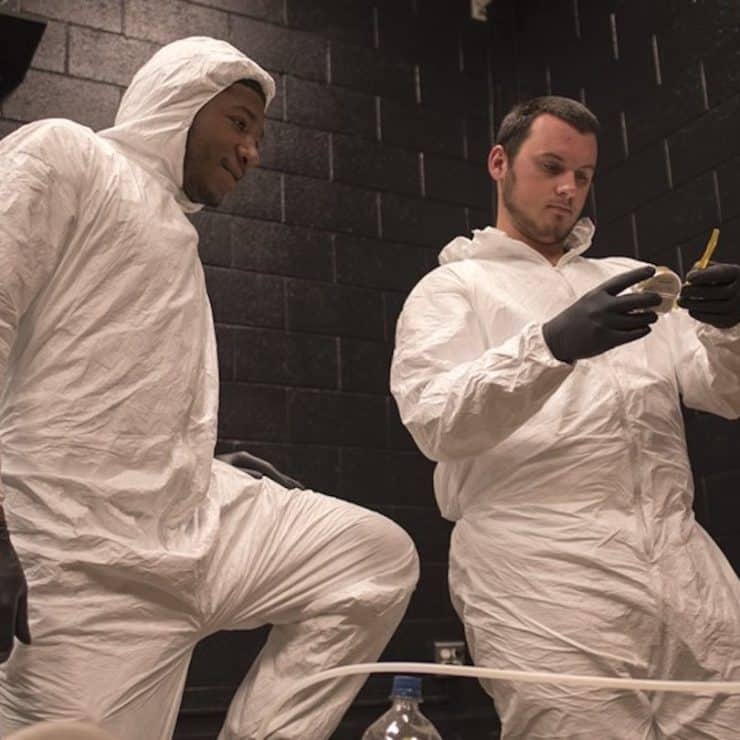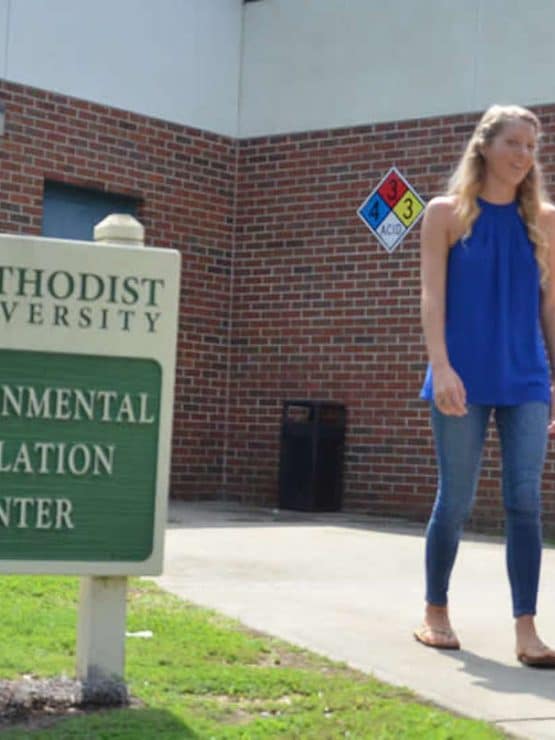
Environmental Health & Safety
Environmental Health and Safety (EHS) is a field that studies and implements laws, rules, regulations, professional programs, and workplace efforts to protect the general well-being and health and safety of the general public and employees in the workplace as well as preserve the environment. EHS professionals are active in a variety of industries and have a direct impact on the operations and activities of the organizations and communities with which they work.
The Environmental Health and Safety program provides fundamental knowledge of environmental science, pollution control and management, occupational and workplace safety, regulatory management and analysis, and program implementation and management that informs and affects the day-to-day operations of companies and individuals alike. Students learn through hands-on instruction, visits to local entities for first-hand perspective of EHS operations in action, practical application, and project-based work that makes use of current events and historical precedent. Graduates are prepared for practice as an EHS professional in both the public and private sector for industries such as manufacturing, construction, healthcare, entertainment, and retail, or to continue studies at the graduate level. Regardless of career path, all graduates possess the necessary critical-thinking, communication, and technical skills to serve as leaders in the industries and communities to which they belong.
Common Career Paths
Graduates within our Environmental Health & Safety can find careers in a wide range of setting including:
- Governmental/Regulatory Agencies
- Business/Industry
- Public Health
- Emergency Management
- Education
- Research
- Agriculture Administration
- Public Safety including Fire
Common Salary Ranges for Graduates
As mentioned above, there’s a long list of career opportunities for those with Environmental Health & Safety degrees. But, the U.S. Bureau of Labor Statistics reports the average annual salary for the following positions (which may require additional education) in North Carolina in 2021:
- Environmental engineers: $100,220
- Environmental engineering technologists and technicians: $56,590
- Environmental scientists and geoscientists: $86,980
- Environmental scientists and specialist including health: $81,240
Average Tuition Cost
The average cost for an incoming residential freshman to attend MU is less than $18,000 – similar to the cost of attending one of the big-box public schools, but with the enhanced value of a highly-regarded private school with a 12:1 student-to-faculty ratio.
While tuition varies, depending on a student’s financial aid package, it’s important to know that the average financial award for an incoming residential freshman at MU is more than $34,000.
Financial Aid & Scholarships
More than 97% of MU students receive some form of financial aid, with the University offering more than $24 million annually to students for scholarships. If a student is active military, family of active military, or a veteran, they may also qualify for MU’s military education benefits.
Interested in Methodist University’s Environmental Health & Safety program?
If you have questions, see the FAQ below or reach out to Dr. Denise Bauer using the contact info at the bottom of the page. If you’re ready to apply today, click the button below!
Frequently Asked Questions
Environmental and Occupational Management (ENM) is a broadly based interdisciplinary field that combines Environmental Science & Management, Occupational and Health Management, Business Management with Legal Studies, Justice Studies, Biology & Chemistry.
Graduates within our Environmental & Occupational Management can find careers in a wide range of setting including:
- Governmental/Regulatory Agencies
- Business/Industry
- Public Health
- Emergency Management
- Education
- Research
- Agriculture Administration
- Public Safety including Fire
Both the Environmental and Occupational Management fields are rapidly growing. There are more and more regulations put in place by government every day and many of these new regulations require qualified individuals to fill the safety and compliance roles. Our program has since its inception maintained a 100% job placement rate within 6 months of graduation. Many of our students graduate with jobs already lined up. This is due to the mandatory 100 hour internship every student must complete as part of their graduation requirement.
In recent years, a variety of fields of expertise have come to the forefront in both governmental and business/industrial operations, including worker safety, plant operational safety, industrial hygiene, environmental protection, and safeguarding of the general public. Historically, it has been extremely difficult for agencies to hire someone educated in all of these fields. After extensive consultation with governmental and industrial representatives making up our advisory board, Methodist University established this program to fill the immediate and future needs of the local and worldwide Environmental and Occupational Management fields. The Environmental and Occupational Management Program will train graduates who are in high demand to work at the entry to administrative level in these and other areas.
MU Disaster Simulation
FEMA Approved Institution
Methodist University has maintained a positive relationship with the Federal Emergency Management Agency (FEMA). Many of our students are accepted into specialized training classes offered at the Emergency Management Institute in Emmitsburg, MD. Our professors make it a point to attend the annual FEMA Emergency Management Higher Education Conference to stay up to date on the newest material available in the field. You will find Methodist Universities ENM Department listed as an approved institution on their site.
Environmental Advisory Compliance Board
Includes representatives from:
- Public Works Business Center, Fort Liberty, NC
- Environmental Health, Cumberland County, Fayetteville, NC
- MJ Soffee, Inc., Fayetteville, NC
- The Kelly Springfield Tire Co., Fayetteville, NC
- NC Department of Crime Control and Public Safety, Burgaw, NC
- NC Department of Transportation, Raleigh, NC
- NC Department of Agriculture, Raleigh, NC
- DuPont, Fayetteville, NC
Simulation Advisory Board:
- North Carolina State Bureau of Investigation
Contact
Denise Bauer, Ph.D., CPE

